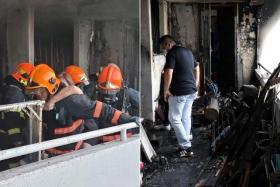Harder to smoke out counterfeits
Plain packaging may lead to spike in illicit cigarettes produced by organised crime syndicates
On May 20, plain cigarette packaging came into full effect in the United Kingdom, as the one-year grace period for retailers and consumers to adjust to the change ended.
The sleek colours found on cigarette packs were replaced by Pantone 448C, a brown-green shade said to be the most visually offensive colour to smokers, to deter them from lighting up.
The idea is to make the product as ugly and dull as possible to discourage younger people from picking up smoking and older ones to quit.
Research from Australia, the first country to introduce plain cigarette packaging, points to a reduction in smoking of 0.5 per cent one year after the policy was introduced in 2012.
Even as Singapore's health authorities mull over a similar move, it is useful to consider the likely unintended consequences of such a policy here from the point of view of ongoing enforcement efforts against illicit tobacco products in the Republic.
Plain packaging is expected to lead to a spike in both the demand and supply of illicit cigarettes locally, on top of possibly bringing back a long forgotten scourge and little-known new vice - counterfeit cigarettes and electronic cigarettes.
A brief survey of Singapore's current illicit cigarette scene is useful.
For some years now, it has been largely made up of two types: "cheap whites" and contraband.
"Cheap whites" are cigarettes of unknown brands produced by organised syndicates just for smuggling purposes.
Contraband cigarettes are authentic tobacco products of well-known brands sold overseas that enter the country illegally, without excise taxes.
As the name suggests, "cheap whites" are sold at a lower price compared with contraband cigarettes - $4.50 a pack compared with $6 for contraband. A pack of duty-paid cigarettes is about $13.
A plain packaging law will set strict specifications on colour, font and style to ensure each cigarette pack conforms to a template.
CRIME GROUPS
Once organised crime groups get their hands on the publicly available requirements, there is little to stop them from recreating legally compliant packaging.
This is particularly significant since existing syndicates already have the capacity to mass produce "cheap whites" in numerous factories around South-east Asia and China. Plain packaging thus makes it easier for criminals to operate and profit.
For law enforcement, it will also be more difficult and inefficient to sift out counterfeits if there is plain packaging. When every pack looks the same, the only way to ascertain if the product is genuine is to analyse the cigarettes in specialised labs of tobacco companies.
The unintended consequences could even spiral beyond the immediate loss of tobacco excise taxes for Singapore. Funds raised from the aforementioned overall spike in the illicit cigarette trade could further fuel underworld crime syndicates, including terror activities and human trafficking.
Besides counterfeits, plain packaging could also lead existing smokers to turn to alternative tobacco products like electronic cigarettes. These are illegal in Singapore and the authorities have been working to make it hard for people to get their hands on them.
But while efforts to clean up online marketplaces such as Carousell and Gumtree have worked, our investigations found sellers moving on to more discreet channels like Instagram, WeChat and WhatsApp.
If plain packaging turns more existing smokers away from the mandated "plain" cigarette packs, but drive them towards sourcing for illegally smuggled e-cigarettes instead, it is merely replacing one problem with another.
This is where the example of Australia, which has one of the highest cigarette prices in the Asia Pacific and one of the toughest anti-smoking laws in the world, is useful.
While legal domestic sales of manufactured cigarettes in Australia have declined since plain packaging laws were introduced, studies have found that the volumes of legal loose tobacco - where users roll their own cigarettes with loose leaves, also known as ang hoon in Singapore - have risen over the same period.
The sale of illicit tobacco also rose, peaking at 14.5 per cent of total tobacco consumption in 2014 and averaging 14 per cent in the last two years. This despite Australia being a relatively isolated continental country.
As for Singapore, as one of the world's most vibrant hubs for the movement of people and goods, the Republic can expect to have it far worse if and when plain packaging is implemented.
It is thus useful for Singapore law enforcement to first observe the results of the UK's plain packaging implementation, before considering if it would work, or how it can be adapted here.
The writer is a director of OPS Consultants, an anti-illicit trade and enforcement consultancy.
Get The New Paper on your phone with the free TNP app. Download from the Apple App Store or Google Play Store now


